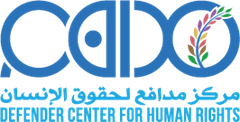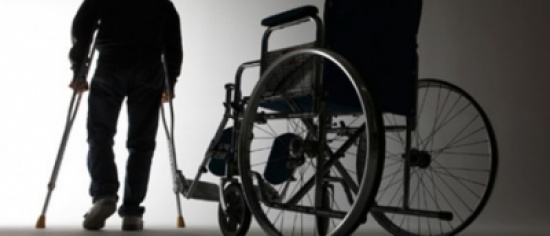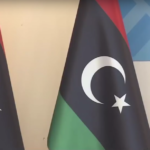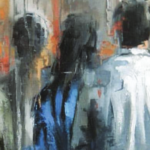Statement on the International Day of Persons with Disabilities
“Who protects the rights of persons with disabilities during the worldwide Coronavirus Pandemic crisis?”
On December 3rd, the world celebrates the International Day of Persons with Disabilities, and the World Health Organization is organizing a celebration this year under the slogan “A Day for All.” The slogan reflects an increased understanding of disability as part of the human condition. Most individuals will experience a temporary or permanent disability at some time in their lives, however, there are few countries where adequate mechanisms are in place to fully meet the needs of persons with disabilities. The United Nations Special Rapporteur on the rights of people with disabilities says: “One in every seven people in the world suffers from a disability, which means about one billion people, and the vast majority of them live in developing countries, while more than 80% of them are poor.”
In Libya, according to figures in the statistical book for the year 2009, the number of persons with disabilities reached more than 82 thousand. This number increased to more than 103 thousand in 2017 according to the director of the Department of the Affairs of the disabled at the Ministry of Social Affairs. The number of persons with disabilities continues to rise due to armed confrontations and the hostilities that break out in Libya from time to time. It reached 120,000 by the end of 2018 according to a statement by the Government of National Accord which confirmed that the statistics do not include the number of disabilities due to injuries in the recent confrontations that took place from April 2019 to June 2020. This is a dangerous indicator of the increasing number of people in need of care and attention, especially in light of the Corona pandemic during which all official policies have missed interest in this segment of society.
On February 24, 2013, Libya ratified the International Convention on the Rights of Persons with Disabilities through Law no. 2 of 2013 issued by the General National Congress; however, the instrument of accession to the convention was not deposited until February 13th, 2018. With this, Libya has become bound to review local legislation to ensure its compliance with the provisions of the Convention and to issue new legislation if necessary in order to respect the dignity of persons with inherent disabilities and their autonomy, including the freedom to decide their own choices, to allow them to be fully and effectively involved in society, and to respect differences and accept persons with disabilities as part of human diversity and human nature.
Human rights organizations and observers followed the apparent failure of the Libyan state to implement the convention that it had ratified, including, for example, but not limited to:
1) The right of accessibility: People with disabilities in Libya suffer from the difficulty of moving and accessing public places for their daily needs. Most administrative and government buildings do not contain entrances for people with disabilities, or they are not properly equipped to enable them to use those easily. Elevators still do not contain prominent numbers so that the blind could use them. In addition, we note the lack of appropriate sidewalks to be used to move from one place to another.
2) The right to education: the state is still unable to meet the needs of people with disabilities in the field of education, as statistics indicate that a large percentage of them are unable to obtain adequate education and professional qualification. Even when they are available, we find them mostly in cities. This breaches the principle of equality and equal opportunities and prevents them from participating effectively in the development of the society.
3) The right to appropriate health care: centers for people with disabilities in Libya suffer from a significant deterioration of services, ranging from the lack of medical and paramedical personnel, whether in terms of numbers or in terms of qualification and training to the lack of medicines and equipment, the lack of specialized centers to provide prosthetic limbs, and the lack of research centers specialized in the affairs of people with disabilities.
4) Job opportunities: It is the duty of the State to work on enforcing and developing laws and legislations related to supporting equality in employment opportunities for people with disabilities compared to others. The state should also work on developing appropriate training and rehabilitation programs for people with disabilities in order to increase their chances of obtaining jobs in the public and the private sectors.
5) Sensitizing about the rights of people with disabilities and combating discrimination: It is the responsibility of the state, the media, local administrations and civil society, each in accordance with their capabilities and competencies, to work on the dissemination of the culture of equality and non-discrimination, the absence of which compromises the dignity and feelings of people with disabilities, to develop national strategies and programs to raise the cultural sensitivity of society, to encourage people with disabilities to participate in development, and to develop programs on the rights of people with disabilities.
The organizations and institutions signing this statement recommend that the ratification of the International Convention on the Rights of Persons with Disabilities should not be aimed at media consumption or at showing Libya ranked among developed countries in the field of preserving the rights of people with disabilities. It is rather a commitment and an obligation for the State to protect and reinforce the rights of persons with disabilities in the society. The organizations and institutions signing this statement calls on all officials to enforce the provisions of this convention and to work on its application on the ground and to overcome all difficulties that may hinder its implementation.
Tripoli,
Organizations signatories to this statement:
- The Blue Eye Association for People with Special Needs, Jadu.
- Al-Khair Association for Persons with Disabilities, Sabrata.
- Biladi Foundation for Human Rights, Sabrata.
- Jurists without restrictions, Benghazi.
- Human Rights Solidarity Organization, Tripoli.
- Al-Bariq Organization for the Rights of the Child, Tripoli.
- The Arab Organization for Women’s Rights, Tripoli.
- The Free Press Foundation, Sabrata.
- The Good Pearls Relief Society, Sabrata.
- “Basmat Amal” Association for Autistic Children, Sabrata.
- “Shumu organization” for people with disabilities, Sabrata.
- February 17th Organization for Environment and Human Rights, Tripoli.
- Al-Aman Organization against Racial Discrimination, Murzuq.
- Urban Organization for Civil Orientation, Kufra.
- The Women’s Wisdom Association for Women and Culture, Kufra.
- Čabu Association for Culture and Heritage, Kufra.
- “Extend a helping hand” Association for charitable work, Kufra.
- Tawasol social and cultural organization
- Amal Janoub” Organization for peace and sustainable development, Murzuq
- Ribyana cultural forum, Ribyana
- Shabeb Bilabi Foundation, Tripoli
- Al Khayr Yajmaouna Association, Zliten
- Shabeb Durj association
- Shabeb Matris association
- Rouwad el Fikr association, Matris
- Ashiraa association for combating Aids and Drugs
- Tebyan association for HR, Durj
- Solidarity association for HR, Tripoli
- Abririne Foundation for Migrants and Humanitarian Aids, Tubruq
- The Defender Center for Human Rights
- The Independent Organization for HR, Misrata
- Wehdat Watan Organization, Misrata




Leave a Reply
Want to join the discussion?Feel free to contribute!